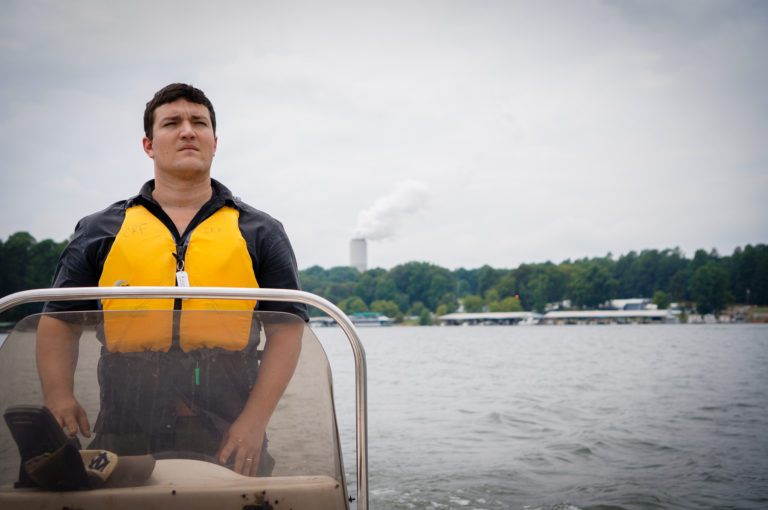
The draft water pollution permit issued by the North Carolina Department of Environmental Quality for Duke Energy’s Allen plant on the Catawba River and Lake Wylie does not protect clean water from toxic pollution, as outlined in comments submitted May 14 by the Southern Environmental Law Center on behalf of the Catawba Riverkeeper Foundation, Sierra Club, and Waterkeeper Alliance.
DEQ’s draft permit:
- Rolls back protections against arsenic, mercury and other toxics contained in a previous draft Allen permit DEQ issued in 2016. DEQ pushed these protections beyond the permit period because Duke Energy asked for the delay and to follow policy statements of EPA Administrator Scott Pruitt, who has proposed eliminating protections for people and their water against coal ash pollution;
- Contains no limits on many of Duke Energy’s toxic pollutants (including arsenic, lead, and mercury) deposited into Lake Wylie and the Catawba River when Duke Energy dumps millions of gallons of coal ash polluted water into the lake and the river upon the closing of the unlined Allen lagoons;
- Weakens testing requirements for Duke Energy’s toxic pollutants;
- Weakens a requirement in the 2016 draft Allen permit for treatment of coal ash polluted water when Duke Energy dumps all of the water from its unlined coal ash lagoons into the Catawba River and Lake Wylie;
- Denies Lake Wylie and the Catawba River protections from toxic pollutants, when DEQ under the previous administration included or proposed limits on toxic pollution in permits for Sutton on the Cape Fear River, Riverbend on the Catawba River, and Cape Fear on the Cape Fear River; and
- Gives Duke Energy amnesty going forward for its illegal flows of coal ash polluted water that Duke Energy constructed to dump into Lake Wylie and the Catawba River. This is the same type of conduct that formed the basis for criminal guilty pleas by Duke Energy companies in 2015.
In the next few years, North Carolina’s rivers will experience a massive one-time pollution event, when Duke Energy closes its leaking coal ash lagoons and dumps all of the polluted water in its unlined lagoons into the state’s rivers and lakes. Duke Energy’s operating coal-burning plants, like Allen, are also discharging more toxic substances into rivers because of better air pollution control technology that captures toxins that would have been emitted from its smokestacks. The Allen draft permit is supposed to protect Lake Wylie and the Catawba River both from toxic pollutants in the millions of gallons of water to be dumped from the coal ash lagoons when they are closed and also from Allen’s increasingly toxic pollution from continued operation of its coal-burning units.
“In its 2018 Allen draft permit, DEQ is not protecting Lake Wylie from Duke Energy’s toxic pollution, but instead is allowing Duke Energy to pollute Lake Wylie and the Catawba River without requiring effective limits, adequate testing, or modern treatment,” said Frank Holleman, senior attorney at the Southern Environmental Law Center. “To make matters worse, DEQ is giving Duke Energy amnesty by legalizing from now on Duke Energy’s illegal constructed flows of its polluted water into Lake Wylie and the River.”
In 2016, DEQ issued a draft permit for the Allen plant that required Duke Energy to control discharges of arsenic, mercury, selenium, and nitrates by February 28, 2021. In the 2018 draft permit, DEQ removed that requirement because Duke Energy asked for it to be removed and because EPA Administrator Pruitt indicated that he might make changes to them at some point in the future. DEQ also failed to include limits on toxic substances when water in Duke’s unlined coal ash lagoons is emptied into the lake and the river. The DEQ 2018 draft permit also weakens water pollution treatment requirements contained in DEQ’s 2016 draft Allen permit.
“People in both Carolinas deserve a discharge permit that protects the Catawba River from Duke Energy’s coal ash pollution,” says Catawba Riverkeeper Sam Perkins. “Instead, even in 2018 after all the issues we have learned about coal ash, DEQ’s draft permit fails to protect the public and ensure that Duke Energy responsibly manages its coal ash.”
The public can comment on this permit through May 18. Public comment on the draft permit modification should be mailed to: Wastewater Permitting, Attn: Allen Permit, 1617 Mail Service Center, Raleigh, N.C., 27699-1617. Public comments may also be submitted by email to: [email protected]. Please be sure to include “Allen” in the email’s subject line.
“North Carolina’s clean water should not be polluted with toxics because Scott Pruitt said he might do something to help out coal ash utilities,” said Dave Rogers, Sierra Club’s Beyond Coal Campaign representative. “Communities should be protected from toxics, and DEQ should focus on how to best protect the North Carolina residents they serve.”
Permits DEQ prepared in 2015 and 2016 for Duke Energy’s Sutton, Riverbend, and Cape Fear coal ash sites included specific limits on toxic substances when Duke Energy dumps millions of gallons of polluted water into rivers when it closes its unlined coal ash lagoons. In the 2018 Allen draft permit, DEQ provided no specific limits on most toxic substances, weakened the requirement for treatment of the polluted water, and reduced the frequency of testing of the polluted water when Duke Energy dumps it into rivers.
“DEQ should be protecting North Carolina’s rivers and lakes, not giving in to Duke Energy or following Scott Pruitt’s lead,” said Larissa Liebmann, Waterkeeper Alliance staff attorney. “The Catawba River and Lake Wylie are facing a historic pollution event when Duke Energy pumps its coal ash polluted water out of the unlined Allen lagoons. In this permit, DEQ should require that the river, the lake, and the Allen community are protected from this dangerous pollution.”